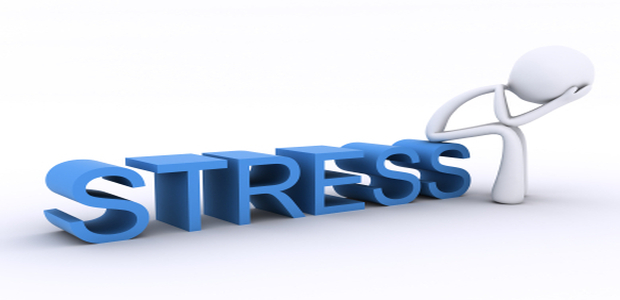Many have a notion that the word stress describes a negative condition in a human. However, there are many instances when even the positive conditions can have an impact on a person’s mental and physical well-being. In certain cases, stress in small doses may actually help us to perform better under pressure, and may be the motivation required to do our best. But in the long run, the price our body and mind pays might be irreversible.
When people talk about stress, they are usually referring to tension or emotional distress. Medically, however, stress is defined as any condition or situation that places undue strain on the body. The sources can be a physical illness or injury, as well as numerous psychological factors— including fear, feelings of anger or frustration, and even unusual happiness.
What constitutes almost unbearable stress to one person may be the spice of life to someone else. In either case, a stressor (a stimulus that causes stress) can trigger the body’s automatic stress-response system. This sets the stage for decreased immunity and increased vulnerability to illnesses, ranging from the common cold to heart attacks and cancer.
Because stress can cause many different symptoms, both physical and mental, it’s often difficult to determine the true source of many problems. A doctor may order medical tests, even if he suspects that stress is the real cause. The following are common manifestation of stress:
Physical symptoms
- Palpitations, shortness of breath, chest pain, and other signs of heart disease (which must be ruled out).
- Unusual rapid breathing, dizziness, or light-headedness.
- Tingling sensations in the hands and/or feet.
- Chronic or recurring backache and neck pain.
- Frequent headaches.
- Diarrhea or constipation.
- Heartburn and other types of digestive problems.
Psychological symptoms
- Difficulty in concentrating and in making decisions.
- Sleep problems.
- Chronic fatigue, even after adequate rest.
- Prolonged anxiety.
- Changes in appetite and an increased reliance on alcohol, nicotine, or other drugs.
- Difficulty coping with what normally would be minor setbacks.
- Decreased enjoyment of pleasurable activities and events.
So can we control the stress which we get from time to time in our lives? Yes we can. Since stress is inevitable and we do have to face them at some point of time in our lives, let us see some really effective ways of coping with stress.
Our natural fight-or-flight response
While physical stress is often episodic, emotional stress is part of daily life. This is not a modern phenomenon. Our early ancestors experienced much more stress than we do—from the constant quest for food to dangers from hostile neighbors and wild animal. While we don’t usually encounter such situations our bodies will still respond to any stress much as they would have in prehistoric times. This stress-coping mechanism called the fight-or-flight response, floods the body with adrenaline and other hormones that raise blood pressure, speed up the heartbeat, tense muscles, and put other systems on alert. Metabolism quickens to provide extra energy; digestion stops as blood is diverted from the intestines to the muscles.
Nutritional needs
Good nutrition is especially important during periods of stress. Prolonged stress, whether psychological or physical, plays havoc with digestion and nutritional needs. Food provides energy, vitamins, and minerals for dealing with stress and helps to counter the negative effects on the body’s immune system. Citrus fruits, bell peppers, and baked potatoes are rich in vitamin C, which helps your body, maintain resistance to infection under stress. Also, one study showed that stressed people who took 1,000 mg of vitamin C daily had milder increases in blood pressure and lower levels of stress hormones. Foods high in zinc such as seafood, meat poultry, milk, eggs, whole grains, and nuts also help to keep your immune system healthy.
When under stress, some people are always hungry and binge on food; others have to force themselves to eat. Because stress interferes with ingestion, it’s better to eat four to six small meals spaced throughout the day instead of the traditional three large ones.
Carbohydrate-rich meals can increase levels of serotonin, a brain chemical that is known to induce a feeling of calm. Studies have shown that stress-prone individuals who eat a diet higher in carbohydrates and lower in protein had less stress-induced depression.
Tips for eating during stressful periods
- No diet will make stress disappear. However, there are steps you can take to help your eating during stressful times:
- Eat breakfast. If you are running on empty, stress can be more difficult to handle.
- Eat slowly. Eating quickly is often associated with digestive upset and this— coupled with stress—can make your food difficult to digest.
- Don’t diet. Changing eating habits is stressful at the best of times.
- Limit your intake of caffeine and alcohol. They can affect your mood and sleep patterns. Alcohol can also heighten feelings of depression.
- Listen to your body and avoid foods that cause you discomfort or digestive upset.
Take a Multivitamin Pill
Studies have shown that chronically stressed people have depressed levels of nutrients in their body, which can be corrected with a multivitamin and mineral supplement. So although there is no pill that will make stress go away or make it easier to cope, if you are not eating well during a difficult period, take a multivitamin and mineral supplement.
Also Read: Top Ten Supplements to Boost Your Life
Comfort foods
Almost everyone has a favorite food that provides comfort during stressful times; the choices vary from one person to the next. For some people, it’s a food that harks back to childhood, such as milk. Others crave chocolate or sweets, which increase the production of serotonin, a brain chemical that has a calming effect. Soups are also favorite choices, as are bland, easy-to- digest foods like rice pudding, custards, yogurt, and omelets. Experiment and go with whatever works best for you.
Better off without
Because stress can play havoc with normal digestion, foods that normally are well tolerated may trigger indigestion and heartburn when you are in a stressful period. Fatty foods, which are difficult to digest at any time, should be avoided as much as possible. Many people also find that hot or spicy foods cause them problems during times of stress.
Avoid caffeinated drinks, which can contribute to jittery feelings. Instead, try herbal teas such as chamomile and peppermint, which have a calming effect. Or substitute low-fat milk, fruit juice, or a non-caffeinated soft drink for caffeinated soft drinks. If you drink coffee, chose decaf.
8 Ways to Relieve Stress
- Make sure you eat regular and healthful meals; several small meals may work best.
- For a few minutes each day, sit quietly with your eyes closed.
- Exercise regularly to increase the production of endorphins, brain chemicals that lift mood.
- Listen to your favorite music; it, too, increases endorphin levels.
- Learn a relaxation technique, such as yoga, meditation, or deep-breathing exercises.
- Consider having a pet; stroking an animal can help you relax.
- Share your problems with a family member, friend, or counselor.
- Make a things-to-do list for the day; arrange the items by importance. Do an item at a time; move undone ones to the next day’s list.
Remember you can handle whatever life throws at you much better when you are eating and sleeping well, and by maintaining a positive outlook. So don’ let stress hijack your life!
-end-




































